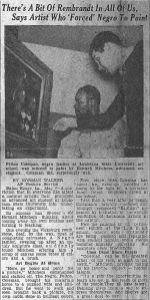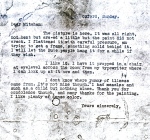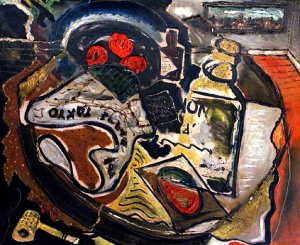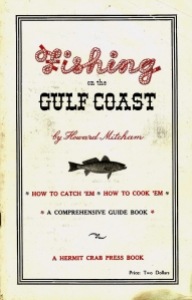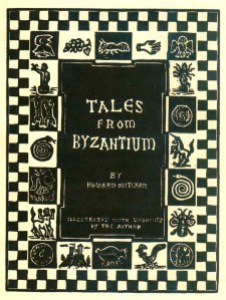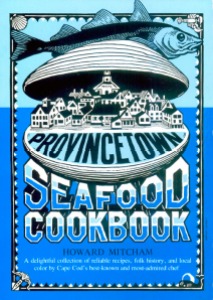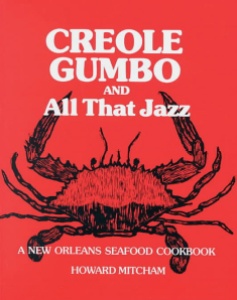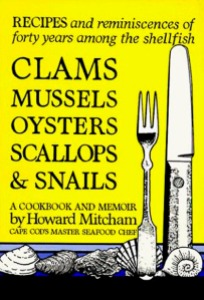Welty’s use of foods in her fiction includes the green tomato pickle in Why I Live at the P.O., the shrimp boil at Baba’s in No Place for You, My Love, and the groaning boards in Delta Wedding. but her interest in foods and cooks is evident in other writings as well.
Welty wrote pieces for a selection of Jackson cookbooks, including Winifred Green Cheney’s Southern Hospitality (1976). Cheney and Welty were old friends, as is evident in this Preface:
A Note on the Cook
Winifred Green Cheney is an old friend and near neighbor of mine in Jackson, Mississippi, and although I am not a cook, I am well equipped to testify to her cooking-from the dining room if not the kitchen. Her cooking is superb. But knowing there are further qualifications for a good cookbook, Mrs. Cheney has seen to those admirably too.
Winifred Cheney has not only collected and thoroughly tested and wisely chosen her dishes, she has learned all about them. She has traveled and tasted all over our part of the world with an alert, investigative interest in the background and provenance of the recipes she works from. The variety of Southern dishes is wide: indeed, the South is a big place-bigger than France, as has been pointed out-and it has had a long history. Its dishes, distinctively Southern as they have become, may go back in origin to the French, Spanish, English, Ger- man, Mexican, Greek, Dalmatian, African, Creole, or Caribbean comers to the land. Mrs. Cheney sets value on this ingredient of flavor. Her respect for the local dish and for the time- honored style of preparing it forms the roux, you might say, on which her own creations are based.
The recipes here come to us by way of long experience in the kitchen and out of the patience of the perfectionist. The zest Mrs. Cheney takes in her cooking comes through in the zest with which she writes down her recipes for us. She makes us acquainted, altogether, with the essence and character as well as the proper substance of the dish at hand.
The cook who can make a dream of a dish isn’t necessarily able thereby to set down for others the exact way to prepare it. can testify that one of the hardest things in the language to write is a set of clear directions. Mrs. Cheney has the gift, and the conscience, for doing it.
Winifred at home cooks for her family, for her friends, of course. She cooks to honor the visitor, and also she cooks for a varying but ever-present list of neighbors or friends who are convalescing from illness, who are in trouble of some kind, who are alone or confined to their homes. (And for some reason known only to her kindness, she includes in her list writers. Let me be confined to my typewriter with a deadline, and, as though it were a fate I didn’t deserve, Winifred appears with something on a tray to sustain me.) The original Lady Bountiful was the invention of an Irish dramatist in 1707. Winifred exists as her own version. She makes her rounds with baskets and trays as a simple extension of her natural hospitality. In good weather but especially in bad, splashing forth in raincoat and tennis shoes, carrying a warm cake straight from her oven, she sympathizes with you or celebrates with you by sharing her table with you.
I hope Winifred does not mind my coming print about her character-after all, it is no secret in her hometown-for my reason is that I believe it has something positive to do with how good the food is. All of Mrs. Cheney’s dishes came about through the explicit idea of giving pleasure to particular people-with real people, and a real occasion, in mind. I think that may be a very good secret of the best cooking.
When Jane Austen’s Miss Bates, attending Mr. Weston’s ball, is seated at the supper, she surveys the table with a cry, “How shall we ever recollect half of the dishes?” When I sit down to Sunday dinner at Winifred’s I feel just like Miss Bates. What guest could not? But it now becomes possible for us to recollect the dishes we’ve dined on there. The cook herself has recollected-and here presented the reci- pes for them. They are here to study and follow in her own cookbook.
It’s a gracious cookbook. It’s like another extension of Winifred Cheney’s hospitality; she has added another leaf to her table.
Welty’s essay in The Country Gourmet (1982), published by the Mississippi Animal Rescue League, while not of a culinary nature in itself, deserves inclusion for its gentle message.
The excellent work of the Mississippi Animal Rescue League has been well known in Jackson and the State for over a decade. It was chartered in 1969 by the State as a non-profit corporation for the prevention of cruelty to animals, and the land on which the Shelter stands (at 4395 South Drive) was leased to the League by the City of Jackson for $1 a year. Its up-to-date record opens our eyes to the scope of its activities. For instance, the number of animals that the League rescues-from abandonment, starvation, cruel treatment, accidents in the streets and as far as possible nurses back to health and offers for adoption as household pets, reaches several thousand a year.
Of necessity, the Shelter has had to grow; it now incorporates a well-equipped Annex. There is at present an operating room set up in a mobile home, but plans have been drawn up for a Clinic, which would offer increased benefit.
The League is in the daily business of saving lives. We who care for the work its personnel, both professional and volunteer, are carrying out, salute them and welcome a chance to support the Mississippi Animal Rescue League. Guarding and protecting, trying to save, all life on earth is a need we all alike share.
Mark Kurlansky, in The Food of a Younger Land (2009), includes an essay of hers entitled “Mississippi Food” that Kurlansky claims was “a mimeographed pamphlet that she wrote for the Mississippi Advertising Commission and which they distributed.” Kurlansky doesn’t provide a date for the essay, but it was likely written in the mid-1930s.
Mississippi Food
Stark Young, in his book Feliciana, tells how a proud and lovely Southern lady, famous for her dinner table and for her closelyguarded recipes, temporarily forgot how a certain dish was prepared. She asked her Creole cook, whom she herself had taught, for the recipe.
The cook wouldn’t give it back.
Still highly revered, recipes in the South are no longer quite so literally guarded. Generosity has touched the art of cooking, and now and then, it is said, a Southern lady will give another Southern lady her favorite recipe and even include all the ingredients, down to that magi cal little touch that makes all the difference.
In the following recipes, gleaned from ante-bellum homes in various parts of Mississippi, nothing is held back. That is guaranteed. Yankees are welcome to make these dishes. Follow the directions and success is assured. Port Gibson, Mississippi, which General Grant on one occasion declared was “too beautiful to burn,” is the source of a group of noble old recipes. “Too beautiful to burn” by far are the jellied apples which Mrs. Herschel D. Brownlee makes and the recipe for which she parts with as follows:
JELLIED APPLES
Pare and core one dozen apples of a variety which will jell successfully. Winesap and Jonathan are both good. To each dozen apples moisten well two and one-half cups of sugar. Allow this to boil for about five minutes. Then immerse apples in this syrup, allowing plenty of room about each apple. Add the juice of one-half lemon, cover closely, and allow to cook slowly until apples appear some what clear. Close watching and frequent turning is necessary to prevent them from falling apart. Remove from stove and fill centers with a mixture of chopped raisins, pecans, and crystallized ginger, the latter adding very much to the fla vor of the finished dish. Sprinkle each apple with granulated sugar and baste several times with the thickening syrup, then place in a 350-degree oven to glaze without cover on vessel. Baste several times during this last process.
Mrs. Brownlee stuffs eggs with spinach and serves with a special sauce, the effect of which is amazingly good. Here is the secret revealed:
STUFFED EGGS
12 eggs
1 lb. can of spinach or equal amount of fresh spinach 1 small onion, cut fine
salt and pepper to taste
juice of 1 lemon or ½ cup vinegar
½ cup melted butter or oil
I large can mushroom soup
Boil eggs hard, peel, and cut lengthwise. Mash yolks fine. Add butter, sea soning, and spinach. Stuff each half egg, press together, and pour over them mushroom soup thickened with cornstarch, and chopped pimento for color.
Last of all, Mrs. Brownlee gives us this old recipe for lye hominy, which will awaken many a fond memory in the hearts of expatriate Southern ers living far, far away.
LYE HOMINY
1 gallon shelled corn
½ quart oak ashes salt to taste
Boil corn about three hours, or until the husk comes off, with oak ashes which must be tied in a bag-a small sugar sack will answer. Then wash in three waters. Cook a second time about four hours, or until tender. -An all day job: adds Mrs. Brownlee.
One of the things Southerners do on plantations is give big barbecues. For miles around, “Alinda Gables,” a plantation in the Delta near Greenwood, is right well spoken of for its barbecued chicken and spare ribs. Mr. and Mrs. Allen Hobbs, of ”Alinda Gables,” here tell you what to do with every three-pound chicken you mean to barbecue:
BARBECUE SAUCE
1 pint Wesson oil
2 pounds butter
5 bottles barbecue sauce (3½ ounce bottles)
½ pint vinegar
1 cup lemon juice
2 bottles tomato catsup (14 ounce bottles)
1 bottle Worcestershire sauce (10 ounce bottles)
1 tablespoon Tabasco sauce
2 buttons garlic, chopped fine salt and pepper to taste
This will barbecue eight chickens weighing from 2½ to 3 pounds. In bar becuing, says Mrs. Hobbs, keep a slow fire and have live coals to add during the process of cooking, which takes about two hours. The secret lies in the slow cooking and the constant mopping of the meat with the sauce. Keep the chickens wet at all times and turn often. If hotter sauce is desired, add red pepper and more Tabasco sauce.
Mrs. James Milton Acker, whose home, “The Magnolias,” in north Mississippi is equally famous for barbecue parties under the magnificent magnolia trees on the lawn, gives a recipe which is simpler and equally delightful:
Heat together: 4 ounces vinegar, 14 ounces catsup, 3 ounces Worcester shire sauce, the juice of 1 lemon, 2 tablespoons salt, red and black pepper to taste, and 4 ounces butter. Baste the meat constantly while cooking.
Pass Christian, Mississippi, an ancient resort where the most brilliant society of the eighteenth century used to gather during the season, is awakened each morning by the familiar cry, “Oyster ma-an from Pass Christi-a-an!” It would take everything the oyster man had to prepare this seafood gumbo as the chef at Inn-by-the-Sea, Pass Christian, orders it:
SEAFOOD GUMBO
2 quarts okra, sliced 2 large green peppers 1 large stalk celery
6 medium sized onions 1 bunch parsley
½ quart diced ham 2 cans #2 tomatoes
2 cans tomato paste
3 pounds cleaned shrimp
2 dozen hard crabs, cleaned and broken into bits 100 oysters and juice
½ cup bacon drippings 1 cup flour
small bundle of bay leaf and thyme salt and pepper to taste
1 teaspoon Lea & Perrins Sauce 1½ gallons chicken or ham stock
Put ham in pot and smother until done. Then add sliced okra, and also celery, peppers, onions, and parsley all ground together. Cover and cook until well done. Then add tomatoes and tomato paste.
Next put in the shrimp, crabs, crab meat and oysters. Make brown roux of bacon dripping and flour and add to the above. Add the soup stock, and throw into pot bay leaves and thyme, salt and pepper, and Lea & Perrins Sauce. This makes three gallons of gumbo. Add one tablespoon of steamed rice to each serving.
The chef at Inn-by-the-Sea fries his chickens deliciously too. He uses pound or pound-and-a-half size fowls. Dressed and drawn, they are cut into halves and dipped into batter made of Qne egg slightly beaten to which one cup of sweet milk has been added, as well as salt and pepper. The halves of chicken are dipped and thoroughly wetted in the batter and then dredged well in dry, plain flour. The chef fries the chicken in deep hot fat until they are well done and a golden brown. He says be careful not to fry too fast.
Two other seafood recipes from the Mississippi Coast come out of Biloxi, that cosmopolitan city that began back in 1669, and where even today the European custom of blessing the fleet at the opening of the shrimp season is ceremoniously observed. “Fish court bouillon” is a mag ical name on the Coast, it is spoken in soft voice by the diner, the waiter, and the chef alike; its recipe should be accorded the highest respect; it should be made up to the letter, and without delay:
FISH COURT BOUILLON
5 or 6 onions
1 bunch parsley
2 or 4 pieces celery
4 pieces garlic
6 small cans tomatoes 1 or 2 bay leaves
hot peppers to taste
Cut up fine, fry brown, and let simmer for about an hour, slowly. Prepare the fish, and put into the gravy. Do not stir. Cook until fish is done. This will serve 8 to 10 people; for 10 or more double the ingredients. To prepare fish, fry without cornmeal, and put in a plate or pan. Pour a portion of the gravy over it, and let it set for a while. Just before serv ing, pour the rest of the hot gravy over the fish.
Another valuable Coast recipe which comes from Biloxi is that for Okra Gumbo.
OKRA GUMBO
2 or 3 onions
½ bunch parsley
5 or 6 pieces celery 1 small piece garlic
4 cans of okra, or a dozen fresh pieces
Cut all ingredients in small pieces and fry brown. Let simmer for a while. If shrimp are desired, pick and par-boil them and add to the ingredients the shrimp and the water in which they were boiled. If oysters or crab meat is desired, add to gumbo about twenty minutes before done.
Add as much water as desired.
Aberdeen, Mississippi, is a good Southern town to find recipes. Old plantations along the Tombigbee River centered their social life in Aberdeen as far back as the 1840’s, and some of the recipes that were used in those days are still being made up in this part of the country.
Mrs. C. L. Lubb, of Aberdeen, uses this recipe for beaten biscuit.
BEATEN BISCUIT
4 cups flour, measured before sifting
¾ cup lard
1 teaspoon salt
4 teaspoons sugar
enough ice water and milk to make a stiff dough (about ½ cup)
Break 150 times until the dough pops. Roll out and cut, and prick with a fork. Bake in a 400-degree oven. When biscuits are a light brown, turn off the heat and leave them in the oven with the door open until they sink well, to make them done in the middle.
Mrs. Bicknell T. Eubanks, also of Aberdeen, prepares Spanish rice this way.
SPANISH RICE
4 tablespoons oil
1 cup rice
1 onion, sliced
1 green pepper, chopped 1 quart canned tomatoes
2 teaspoons salt
a little less than ¼ teaspoon pepper
Heat 2 tablespoons oil in large frying pan and add rice. Cook until brown, stirring constantly. Cook remaining 2 tablespoons oil with onion and green pepper until the onion is yellow and tender. Combine with rice. Add tomatoes and let it simmer until the rice is tender, stirring constantly. Add a little hot tomato juice if the rice seems dry. Add sea sonings. Serves 6.
Vicksburg, in the old steamboat days Mississippi’s wicked, wide-open town, lived high with all the trimmings. Perched on the bluffs overlook ing the Mississippi, it is famous still for its excellent catfish. The dis armingly simple recipe for preparing it is here given:
Take a catfish weighing ½ pound. Season well with salt and pep per, and roll in cornmeal. Use a pot of deep fat with temperature of 360 degrees. Place the fish in the pot and fry until done. Serve very hot.
To go along with the fish, the Hotel Vicksburg serves a wickedly hot potato salad, prepared as follows:
1 quart sliced potatoes (cooked) 6 pieces chopped crisp bacon
3 chopped hardboiled eggs
1 minced large green pepper
2 minced pimentos
4 tablespoons mayonnaise
2 tablespoons prepared mustard salt and pepper to taste
Mix and serve with quartered tomatoes, sliced dill pickles, mixed sweet pickles, and quartered onions.
A collection of recipes from the Old South is no more complete than the Old South itself without that magic ingredient, the mint julep. In the fine old city of Columbus, in the northeastern part of the state, hospitality for many years is said to have reached its height in “Whitehall,” the home of Mr. and Mrs. T. C. Billups. “The drink is refreshing,” says Mrs. Billups, needlessly enough, “and carries with it all the charm of the Old South when life was less strenuous than it is today; when brave men and beau tiful women loved and laughed and danced the hours away, but in their serious moJnents, which were many, aspired to develop minds and souls that made them among the finest people this old world has known.” The “Whitehall” recipe is as follows:
MINT JULEP
Have silver goblet thoroughly chilled.
Take half lump sugar and dissolve in tablespoon water.
Take single leaf mint and bruise it between fingers, dropping it into dissolved sugar.
Strain after stirring.
Fill the goblet with crushed ice, to capacity.
Pour in all the bourbon whiskey the goblet will hold. Put a sprig of mint in the top of the goblet, for bouquet. Let goblet stand until FROSTED.
Serve rapidly.
Who could ask for anything more?
Then we have Welty’s introduction to The Jackson Cookbook, “The Flavor of Jackson”, arguably the finest example of Southern culinary exposition, a finely-seasoned piece fashioned by a master.
The Flavor of Jackson
Most Jacksonians would agree, I think, that Jackson has always characteristically dined at home and entertained at home, and does so still by first preference. It’s been out natural form of hospitality as of course its been the most logical and economical way to live.
There was indeed and for many years, the elegant dining room of the Edwards House ready for the important or large occasion. But we were too small a place and too far inland from the Gulf or New Orleans to have been heir to restaurants of another kind: one Mexican at his hot tamale stand, on the corner of North West and Hamilton during the cold months, couldn’t make us cosmopolitan. Rather than anything else, I think—and I like to think—the word for the Jackson flavor is “home”.
It was mostly the young who went forth with any regularity for outside refreshment. After the movies, the ice cream parlor. After “The Thief of Bagdad” at the Majestic, the other dime went for the strawberry ice cream soda at McIntyre’s. And wasn’t it Mr. Key’s Drug Store that seemed a functionable part of the Century Theatre? It had purple paper grapes on a cardboard trellis overhead—almost like a part of the stage scenery to come. Just before curtain time, my father took me in there and presented me with the box of Jordan’s Almonds—“bird eggs”—that was part of the theatre rite. Some tired road company would go through its Victor Herbert for us, but it was magic, all the same, and holding a “bird egg” in the mouth (impossible to swallow, in the excitement) was part of the magic.
When the whole family sallied forth for refreshment, it was very likely after supper on hot nights just before bedtime. They’d get in the car and drive to Seal Lily’s and have ice cream cones all around; it was best to hold them outside the car and eat them through the windows, and finish fast before the last bit melted.
But parties were given at home, and they started—I believe it was true for old and young—plenty early in the afternoon. You began eating around 3:30 and kept it up until you had entirely spoiled your supper. Party food drew its praises for how pretty it was (example, Bridemaids’ Salad, all white down to the white grapes) or for how much trouble the hostess went to make it (Pressed Chicken), but it’s a safe bet that all the refreshments were the successes they were because they were rich—thunderously rich.
Sometimes we branched out from home as far as Shadow Lawn. When parties were given there it wasn’t in order to save the trouble at home but to offer the guests a change—an al fresco in the quiet country air of the Terry Road. Some of our high school graduation “teas” took place at Shadow Lawn. The receiving line stood there on Miss Anita Perkins’s lawn, in the very early shadows, and the punch bowl waited on her porch, and there were her own delicious things to eat—frozen fruit salad was her specialty—and all was elegant. It was the era of the Madeira tea napkin. I believe I could say that more tea napkins were handed round at that high-minded time than I ever saw in my life, before or since. (And at least half of them must have been embroidered by Miss Irene Anderson. She too was very much a part of the flavor of Jackson.)
As a child, I heard it said that two well-travelled bachelors of the town, Mr. Erskin Helm and Mr. Charles Pierce, who lived on Amite Street, had ‘brought mayonnaise to Jackson’. Well they might have though not in the literal way I pictured the event. Mayonnaise had a mystique. Little girls were initiated into it by being allowed to stand at the kitchen table and help make it, for making mayonnaise takes three hands. While the main two hands keep up the uninterrupted beat in the bowl, the smaller hand is allowed to slowly add the olive oil, drop-by-counted-drop. The solemn fact was that sometimes mayonnaise didn’t make. Only the sudden dash of the red pepper into the brimming, smooth-as-cream bowlful told you it was finished and a triumph.
Of course you couldn’t buy mayonnaise and if you could, you wouldn’t. For the generation bringing my generation up, everything made in the kitchen started from scratch. There was a barrel of flour standing in the kitchen! Perhaps a sugar barrel too. The household may have provided (ours did) its own good butter (which implies a churn, and, of course, a cow), and its own eggs, and most likely it grew its own tomatoes, beans, strawberries, even asparagus. There’d be the seasonal rounds of the blackberry lady, appearing with her buckets at your door, and the watermelon man with his load, who’d plug you one to your taste, and the regulars sending their cries through the summer streets—“Butterbeans, snapbeans and okra!”—followed by the ice cream man, of course. Meat? Why your mother called up the butcher, talked to him, asked what was especially nice today, and let him send it. There was communication with butchers. And my father sometimes saw them, for he’d stop by on his way from the office and come bringing home by hand the little squared-off, roofed over, white cardboard bucket with the wire handles, fragrant and leaking a little—and produced oysters for supper, just ladled out of the oyster barrel that the butcher got in from New Orleans.
And of course they grated from whole nutmegs, they ground coffee from the beans, went to work on whole coconuts with the hatchet. Some people knew how to inveigle for the real vanilla bean. (Vanilla must have had a central importance in those days—think of all the cakes. Wasn’t there a local lady who made her living, and her entertainment, just selling vanilla extract over the telephone?)
Our mothers were sans mixes, sans foil, sans freezer, sans blender, sans monosodium glutamate, but their ingredients were as fresh as the day; and they knew how to make bread.
Jackson believed in and knew how to achieve the home flavor. And if ever there was a solid symbol of that spirit, one that radiates its pride and joy, it is the hand-cranked ice cream freezer. I see it established in a shady spot on a back porch, in the stage of having been turned till it won’t go around another time; its cylinder is full of its frozen custard that’s bright with peaches, or figs, or strawberries, its dasher lifted out and the plug in tight, the whole packed with ice and salt and covered with a sack to wait for dinner—and right now, who bids to lick the dasher?
I daresay any fine recipe used in Jackson could be attributed to a local lady, or her mother—Mrs. Cabell’s Pecans, Mrs. Wright’s Cocoons, Mrs. Lyell’s Lemon Dessert. Recipes, in the first place, had to be imparted—there was something oracular in the transaction—and however often they were made after that by others, they kept their right names. I Make Mrs. Mosal’s White Fruitcake every Christmas, having got it from my mother, who got it from Mrs. Mosal, and I often think to make a friend’s fine recipe is to celebrate her once more, and in that cheeriest, most aromatic of places to celebrate in the home kitchen.
Jackson had its full plenty of recipes, but I hardly remember a cookbook. My mother had the only one I ever saw as a child, “The White House Cookbook”. I don’t recall which president’s wife was in headquarters at the time of our edition, but the book opened to a full-length drawing of a deer, complete with antlers, marked off with dotted lines to show how to cut it up for venison, which suggests poor Mrs. Teddy Roosevelt. The most useful thing about “The White House Cookbook” was its roomy size, for in between its pages could be stored the recipes jotted down on scraps of paper and old envelopes, that my mother really used. They accumulated themselves over the years from friends and relations and from her own invention and a time or two from the Mystery Chef who came in over the radio. She had a cookbook within a cookbook. She had some of the making, in fact, of the very sort of cookbook that this one (i.e. The Jackson Cookbook) is certain to be. Today there’s a cookbook available for every conceivable purpose and occasion, but in this one we come a full circle: we’re back again to the local using these cherished recipes we can make and delight in the fruits of Jackson itself.
I’d like to express the pious hope that we’re to find these recipes given in full. My mother’s don’t do me as much good as they might because she never included directions. Her reasoning, often expressed, was that any cook worth her salt would know, given a list of ingredients, what to do with them, and if she did come to a momentary loss while stirring up a dish—taste it! Cooking was a matter of born sense, ordinary good judgment, enough experience, materials worth the bothering about, and tasting. I had to sit on a stool while she made spoonbread and take down what I saw like a reporter, to get her recipe.
I can’t resist adding this, for I think it applies. John Woodburn was a New York editor who’d com through Jackson on a scouting trip for young unknown writers and spent a night at our house. He carried my first collection of stories back with him and worked very hard trying to persuade his editor to take them. Several years later, when he succeeded, he sent me a telegram to say, “I knew as soon as I tasted your mother’s waffles it would turn out all right.”





